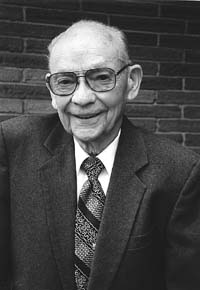Winston Purvine ’33, a legend in his own time

“Dr. Purvine is, indeed, a legend in his own time,” says OIT President Martha Anne Dow.
OIT’s milestones are Purvine’s accomplishments. As a 36-year-old man, he welcomed students through the doors at Oregon Vocational School in 1947. At the time, demand for technical workers was exploding, and OVS devised cutting-edge curricula for electronics, medical technology and civil engineering, writes Jesse Crabtree in OIT, Oregon Tech’s First 30 Years.
Purvine directed the OVS transition from trade and vocational school to technical institute (Oregon Technical Institute), then to polytechnic college (OIT). By 1966, the institute granted bachelor of arts degrees. The master’s degree program, predicted by Purvine years ago, started in 1995.
In 1993, Purvine became the 12th person nationwide to be cited as a Pioneer in Engineering Technology Education by the American Society for Engineering Education.
“There were no blueprints to follow and the effort was pioneering,” writes Crabtree.
OVS’ infancy was not easy. The cost of heating the converted Marine barracks became a rallying cry for critics. Legislators continually battled over providing funding. Purvine, who was unflappable, remained committed to his goal.
“A bit of philosophy helped especially in the early years,” Purvine says. He quotes San Franciscan philanthropist Benjamin H. Swig: “Nothing will ever be attempted if all possible objections must be first overcome.”
For the 1988 dedication of Purvine Hall, then-Governor Neil Goldschmidt wrote, “When OVS was established in 1947, he [Purvine] set the guidelines and standards of excellence, which established the institute’s respected reputation.”
In 1969, the James H. McGraw Award for Outstanding Contribution to Engineering Education cited Purvine “for his insistence on the highest standards of excellence in education and for his ability to coordinate the thinking and action of legislating, advising and governing bodies.”
Purvine always knew what he wanted and succeeded by accurately assessing his audience or his adversary. He excelled in debate and made the team as a freshman at Albany College, the forerunner of Lewis & Clark College.
“I’m thankful the Lord gave me the ability to understand and communicate with people,” Purvine says, “My education and experiences at Albany increased those skills.”
When Purvine graduated from Albany in 1933, unemployment stood at 24.9 percent nationwide. During the Depression, Purvine used his claw hammer to earn a living. He helped his father build one of many houses in Independence. The elder Purvine, a hop farmer, learned home building via a mail-order architectural course. The experience became a motivator throughout young Purvine’s life.
His oratory and debate skills earned him a scholarship to Oregon State College. Still, Purvine picked Albany College because he believed it would afford greater opportunity to excel.
“A more alluring reason for enrolling at Albany,” the 88-year-old says, “was its academic excellence.”
In 1960, Lewis & Clark honored Purvine with a doctorate of laws, noting his “considerable imagination, technical experience, engineering knowledge, great persistence and schoolmaster’s devotion.”
When Purvine retired in 1976, the Oregon State Board of Higher Education awarded him emeritus status and OIT bestowed a doctorate of humane letters.
—by Kris Anderson
More L&C Magazine Stories
Lewis & Clark Magazine is located in McAfee on the Undergraduate Campus.
MSC: 19
email magazine@lclark.edu
voice 503-768-7970
fax 503-768-7969
The L&C Magazine staff welcomes letters and emails from readers about topics covered in the magazine. Correspondence must include your name and location and may be edited.
Lewis & Clark Magazine
Lewis & Clark
615 S. Palatine Hill Road MSC 19
Portland OR 97219

